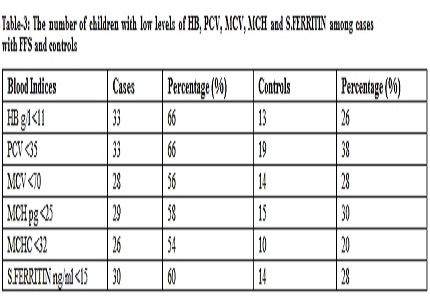Iron deficiency as a risk factor for febrile seizures
Abstract
Introduction: Febrile seizures (FS) are a form of acute symptomatic seizures. Iron deficiency Anaemia (IDA) is one of the most common nutrition related problems in the world. Iron is important for neurological functions and development of brain.
Methods: A case control study was done among 100 children at the Pediatric department, NRI Medical College & Hospital. Total of 100 children between age group of 6 months – 6 years with fever were included, out of which 50 children with first febrile seizure were enrolled as cases. 50 children with fever without seizure were enrolled as control group. A pre designed proforma was used to collect the relevant information. Blood samples collected from all cases and control groups and estimated for hematological parameters.
Results: The mean age in months was 22.4 among cases and 26.7 months in controls. Nine cases had a positive family history of febrile seizures. Respiratory tract infections were most common underlying cause of illness. The mean and standard deviation values of all the hematological parameters (HB, PCV, MCV, MCH, MCHC & serum Ferritin) showed that measurements were lower among cases compared to control and it was statistically significant.
Conclusions: IDA was more frequent among children with FS than those with febrile illness alone. The result suggests that IDA may be a risk factor for FS. Screening for IDA should be considered in children with First Febrile Seizures (FFS).
Downloads
References
2. Commission on Epidemiology and Prognosis, international league against epilepsy. Guidelines for epidemiologic studies on epilepsy.Epilepsia1993;34:592. [PubMed]
3. Nakayama J, Hamano K, Iwasaki N, Nakahara S, Horigome Y, Saitoh H, Aoki T, Maki T, Kikuchi M, Migita T, Ohto T, Yokouchi Y, Tanaka R, Hasegawa M, Matsui A, Hamaguchi H, Arinami T. Significant evidence for linkage of febrile seizures to chromosome 5q14-q15. Hum Mol Genet. 2000 Jan 1;9(1):87-91. [PubMed]
4. World Health Organization. Iron Deficiency Anemia. Assessment, Prevention and Control. A Guide for Program Managers. WHO/NHD/013;Geneva: 2001.
5. Beard J. Iron deficiency alters brain development and functioning. J Nutr. 2003 May;133(5 Suppl 1):1468S-72S.
6. Wike WM, Kiser WR. Iron deficiency anaemia and febrile convulsions. Possible confounding factors include lead toxicity.... BMJ. 1996 Nov 9;313(7066):1205. [PubMed]
7.Prasad AN, Seshia SS. Susceptibility to febrile seizures: more than just a faulty thermostat! Can J Neurol Sci. 2009 May;36(3):277-9. [PubMed]
8. Batra J, Seth PK. Effect of iron deficiency on developing rat brain. Indian J Clin Biochem. 2002 Jul;17(2):108-14. doi: 10.1007/BF02867982. [PubMed]
9. Yager JY, Hartfield DS. Neurologic manifestations of iron deficiency in childhood. Pediatr Neurol. 2002 Aug;27(2):85-92. [PubMed]
10. Hartfield DS, Tan J, Yager JY, Rosychuk RJ, Spady D, Haines C, Craig WR. Clin Pediatr (Phila). 2009 May;48(4):420-6. doi: 10.1177/0009922809331800. Epub 2009 Feb 19. [PubMed]
11. Daoud AS, Batieha A, Abu-Ekteish F, Gharaibeh N, Ajlouni S, Hijazi S. Iron status: a possible risk factor for the first febrile seizure. Epilepsia. 2002 Jul;43(7):740-3. [PubMed]
12. Vaswani RK, Dharaskar PG, Kulkarni S, Ghosh K. Iron deficiency as a risk factor for first febrile seizure. Indian Pediatr. 2010 May;47(5):437-9. Epub 2009 Sep 3. [PubMed]
13. Yousefichaijan P, Eghbali A, Rafeie M, Sharafkhah M, Zolfi M, Firouzifar M. The relationship between iron deficiency anemia and simple febrile convulsion in children. J Pediatr Neurosci. 2014 May;9(2):110-4. doi: 10.4103/1817-1745.139276. [PubMed]
14. Kumari PL, Nair MK, Nair SM, Kailas L, Geetha S. Iron deficiency as a risk factor for simple febrile seizures--a case control study. Indian Pediatr. 2012 Jan;49(1):17-9. Epub 2011 May 30. [PubMed]
15. Boshra A.T. Ahmed. Iron Deficiency as a Risk Factor for Simple Febrile Seizures. Med. J. Cairo Univ. 2013; 81 (2):51-54. [PubMed]

Copyright (c) 2016 Author (s). Published by Siddharth Health Research and Social Welfare Society

This work is licensed under a Creative Commons Attribution 4.0 International License.


 OAI - Open Archives Initiative
OAI - Open Archives Initiative


